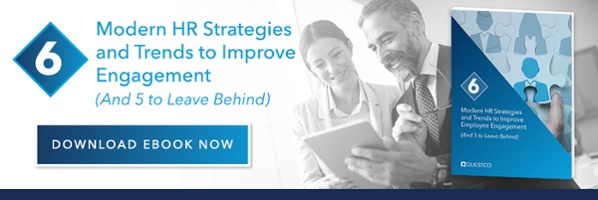Topic Employee Engagement,
Building a Stronger Company Through Diversity of Thought and Experience
.jpg)
December 6, 2019 | By Laura Platero
.jpg)
Companies from Johnson & Johnson to Kaiser Permanente are embracing diversity, and it's not just to avoid discrimination lawsuits. They have found that by having staff with a variety of life experiences, they gain the benefits of diversity of thought processes and world views. This leads to more innovation, better problem-solving, and increased sales or better services.
Why Groupthink is Bad for Your Company
People with different backgrounds see challenges and problems in different ways. By bringing them together, you gain the advantage of having multiple perspectives that are readily accessible. This helps to prevent groupthink, which is a term that describes what happens when everyone on a team approaches an issue with the exact same mindset and thought process.
Groupthink is driven by a desire to put group consensus above everything else. This causes unpopular opinions to go unspoken. According to Expert Program Management, the Challenger space shuttle disaster was a result of this sort of "thinking." The program found that some key people had private reservations about the launch, but nobody said anything because they didn't want to be thought responsible for "delaying the launch."
While an ill-advised consensus may not cause death, it can be devastating for your company. PR disasters where you have to wonder, "didn't anybody catch that before it went live?!” are often the result of groupthink. A culture where speaking up is seen as being uncooperative or "not a team player" is certain to allow many mistakes to go forward.
How Diversity Stops Groupthink
Diversity ensures that the people on your team aren't all looking at things from the same perspective. This not only helps to ensure that someone will spot problems before they become major, but diversity of thought also increases the chances that someone will know how to proceed when the team is faced with an obstacle.
Diversity of thought also prevents many of the more-insidious problems that come with groupthink, such as the tendency to feel that one's viewpoints are morally superior, that the group is invincible and immune to error, and that the out-groups should be vilified. Forbes warns that "out-groups" can come to include your customers and other important groups who are actually essential to your company.
Diversity includes a variety of age groups and hiring durations as well as ethnicities and genders. This ensures that the cultural norms of specific eras do not override cognitively diverse thought.
Forbes gives special praise to Millennials for this diversifying effect. However, a group of all Millennials would be just as un-diverse as any other uniform group.
Discard Old Definitions of "Ideal Employees."
Look beyond those who fit the traditional mold of "ideal employees" to get the needed diversity of thought. Look for people who live in different ways and approach things with different mindsets. You may need to adjust your management style to accommodate them, but it's worth it.
Hiring for thought diversity and differing experiences is more challenging than just going down a checklist of traits and beliefs. One way to make it easier to get the thought diversity your company needs is to work with a Professional Employer Organization (PEO). The best PEOs can deploy HR experts whose different specializations and thought processes decrease risks originating from outdated groupthink.
.jpg)
Laura Platero
Laura serves as the Director of Product Strategy. She is an expert in large scale benefits account management, project management, product development, sales, customer service, and benefits consulting.



